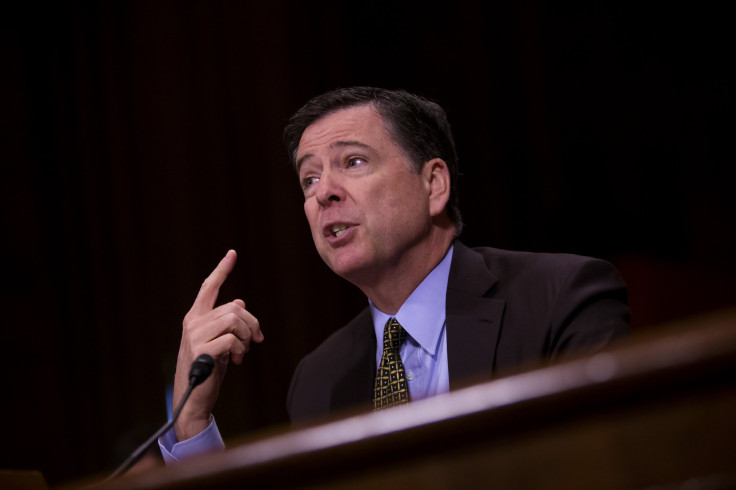Special Counsel Robert Mueller Could Object To James Comey's Public Testimony Before Intelligence Committee

Following the news of James Comey's open hearing before the Senate Intelligence Committee, Senate Judiciary Committee Chairman Chuck Grassley on Saturday expressed doubt over the intelligence committee testimony being allowed to take place.
In a tweet, he said: "I would not be surprised if the new Special Counsel Mueller stops Comey for testifying before the Senate Intelligence Committee."
I wld not be surprised if the new Special Counsel Mueller stops Comey fr testifying b4 the Senate Intelligence Comm even tho Comey is wiling
— ChuckGrassley (@ChuckGrassley) May 20, 2017
Earlier, Grassley and Ranking Member Dianne Feinstein released a statement after Comey declined a bipartisan invitation to testify before both the Senate Judiciary Committee and the intelligence committee.
In the statement, Grassley and Feinstein expressed their disappointment saying: "There is no reason he can’t testify before both the Intelligence and Judiciary Committees, particularly given that the Judiciary Committee is the FBI’s primary oversight committee with broad jurisdiction over federal law enforcement, FISA and the nomination of the next FBI director. He should reconsider his decision."
Just in: The Senate Judiciary Committee says Comey will NOT testify before the Committee, says they're "extremely disappointed". pic.twitter.com/QBle3FdhJP
— Kyle Griffin (@kylegriffin1) May 19, 2017
Former FBI Director James Comey has however agreed to testify publicly before the Senate intelligence committee sometime after Memorial Day, which is on May 29, committee leaders announced in a statement Friday.
Chairman of the Senate Select Committee Richard Burr and Vice Chairman Mark Warner said in the statement his testimony "will help answer some of the questions that have arisen since Comey was so suddenly dismissed by the president."
"The committee looks forward to receiving testimony from the former director on his role in the development of the intelligence community assessment on Russian interference in the 2016 US elections, and I am hopeful that he will clarify for the American people recent events that have been broadly reported in the media," Burr said in the statement.
Since there has not been such a situation earlier, it could still be possible the newly appointed special counsel Robert Mueller would object to the former FBI director speaking in public about an ongoing investigation.
Senator Lindsey Graham said Thursday the appointment of a special counsel meant "Congress’s ability to conduct investigations of all things Russia has been severely limited." He also raised concerns whether witnesses would testify to Congress and risk involving themselves in Mueller’s criminal investigation.
After Comey agreed to testify before the intelligence committee, Graham said in a statement: "I very much appreciate former FBI Director James Comey’s willingness to publicly testify about his conversations with President Trump and other relevant matter. I am surprised he will do so given the fact we now have a Special Counsel who will likely be investigating matters related to their conversations."
My statement on news former FBI Director Comey will not testify before the @senjudiciary Committee. pic.twitter.com/35zTW5OMKg
— Lindsey Graham (@LindseyGrahamSC) May 20, 2017
Justice Department appointed Mueller on May 17 as special counsel to oversee the investigation into alleged connections between President Donald Trump’s campaign and Russian officials. The 72-year-old attorney was a former FBI director before Comey and has a long history with investigations and public service.
The decision to name Mueller as special counsel came after a huge turmoil in the administration last week after the sudden dismissal of Comey. It also followed the subsequent disclosure Trump asked Comey to discontinue the investigation of his former National Security Officer Michael T. Flynn who had alleged ties with Russian officials.
Read: Who Is Joseph Lieberman? Trump's Top Choice For FBI Director Is A Supporter Of Mass Surveillance
Earlier on Friday, the New York Times reported Trump told top Russian officials Comey was a "nut job" and his dismissal relieved "great pressure." The newspaper also reported the president had asked for Comey to let go of the investigation into former national security advisor Michael T. Flynn.
In a joint conference with Colombian President Juan Manuel Santos, Trump flatly denied he ever made such a statement or suggestion. He said "No. No…next question."
© Copyright IBTimes 2024. All rights reserved.






















